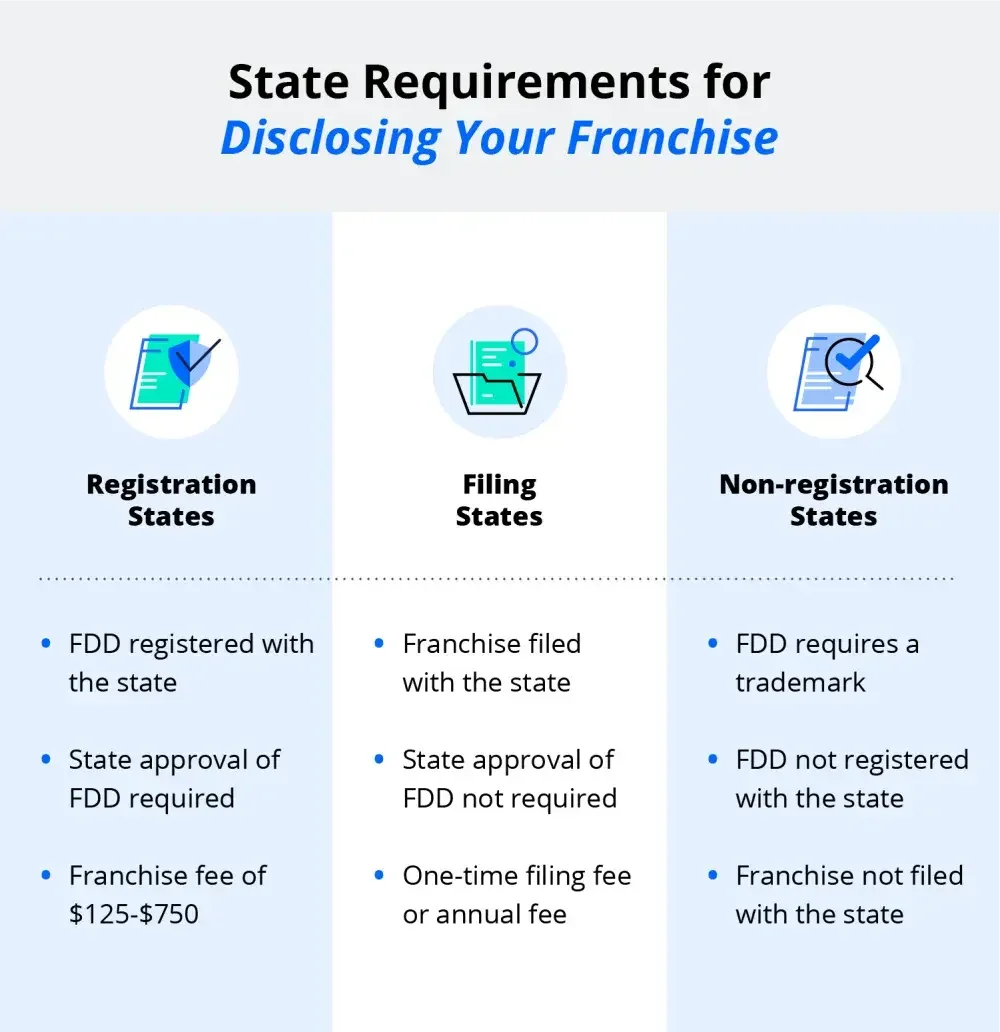
After the initial stages of starting a business, many entrepreneurs begin to consider how to scale. Franchising is one way to grow a successful operation. Read on to learn:
- What franchising your business means
- How to franchise your business
- The pros and cons of becoming a franchise
What does it mean to franchise a business?
Franchising is a type of agreement that entails reproducing a successful business model across multiple locations. As the business owner and franchisor, you would create a franchise agreement to begin the process and move toward opening a new franchise.
This agreement allows franchisees to attain limited rights to your intellectual property, supply chain networks, training systems, and more in order to open and operate a new location for your business.
Franchising vs. licensing: What's the difference?
Franchising and licensing are two different ways to share your brand information in exchange for a fee. The distinctions between franchising and licensing center around control and operation:
- Franchise agreement: Gives the franchisee access to comprehensive information that's needed to create a new location under an already successful business model
- Best for: service-based businesses
- Example: A McDonald's, franchised by the corporation in agreement with a local entrepreneur
- License agreement: Gives the licensee access only to specific intellectual property, like a logo or a particular character
- Best for: Product-centric businesses
- Example: Disney licenses the Mickey Mouse character to appear on a line of sweatshirts from a retailer.
What are the 4 types of franchises?
When you franchise your business, you'll likely create one of four different types of franchises:
- Job franchise: Businesses offering a service on behalf of the franchisor
- Example: Travel agencies
- Distribution franchise: Product-centric businesses that also offer related services
- Example: Car repair shops
- Business format franchise: Entire established business models provided by the franchisor
- Example: Fast food restaurants
- Investment franchise: Large, service-centric business
- Example: Hotels
The type of franchise that's right for you depends on the size and complexity of your business as well as the industry you operate in.
How long does it take to franchise my business?
Including preparation, franchising typically requires three to four months of time. The process can move more quickly depending on how complicated your business model is.
How much should it cost to franchise my business?
The cost to franchise varies depending on industry, state of residence, and more. Sometimes, it can cost less than $20,000 total, but some franchises push costs near $100,000 or higher.
The Federal Trade Commission (FTC) regulates franchise operations at the federal level, but each state has its own rules and requirements for franchise operation. To make sure you don't miss any state-specific requirements, it's best to speak with a franchise attorney who can help you prepare documents in your specific state.
How to franchise a business
Once you decide to franchise your small business, you'll need to prepare to take on the new independent contractors that will run their individual franchises.
Here are the seven main steps (with explainers) that you'll need to take.
- Make sure your business is ready to franchise
- Protect your business's intellectual property
- Prepare a financial disclosure document (FDD)
- Draft a franchise agreement
- Compile an operational manual for franchisees
- File or register your FDD
- Set a strategy to achieve your sales goals
1. Make sure your business is ready to franchise
Before embarking on the franchising journey, there are a few questions you should ask yourself to ensure your business is ready to franchise.
- Is my business healthy and profitable?
- Am I able to afford franchising and expansion, or borrow necessary funding?
- Can I clone my business model effectively?
- Have I already expanded to another location successfully?
- Do I have the capability to market and sell my franchise opportunities?
- Am I comfortable acting as a teacher and supporter to franchisees?
The answer doesn't need to be “yes" to every question, but you should aim to give honest answers to highlight any weaknesses that may be in your blind spots.
According to Blair Nicol, CFE, vice chairman and principal of franchise consulting firm FranNet, it's best to start with an original location that already has an established presence. Small business owners, he said, “should have already duplicated the concept a few times. That way, they have a replicable model that has been proven to work anywhere."
2. Protect your business's intellectual property
A central element to franchising your business is granting franchisees access to a wealth of intellectual property. This allows them to brand their franchise according to your guidelines and also encourages the growth of your business. But it can expose you to risks if your intellectual property isn't adequately protected.
- Example: If your business guards trade secrets or has unprotected intellectual property, franchising could expose that property to theft or misuse.
Before delving deeper into the franchise process, make sure you protect the intellectual property that makes your business unique and recognizable.
3. Prepare a franchise disclosure document (FDD)
According to the Franchise Rule, you can only sell a franchise to a prospective franchisee once you provide them an FDD that's in compliance with FTC rules and regulations.
An FDD is like the articles of organization for your franchise—it introduces key players, defines operating terms, includes financial statements, and addresses obligations of your franchise agreement. In fact, it must contain 23 specific sections according to the Franchise Rule:
- Franchisor: Names and describes the franchisor and any parents, predecessors, and affiliates
- Business experience: Summarizes the business experience of the franchise company's management
- Litigation: Discloses past and present criminal and civil lawsuits for anyone under the franchise
- Bankruptcy: Details any bankruptcies filed by franchise management
- Initial fees: Discloses upfront costs to the franchisee, like the franchise fee or a fee to review a franchise lease
- Other fees: Highlights any recurring or periodic charges, such as for advertising or royalties
- Initial investment: Details the estimated initial expense that the franchisee must make to establish the franchise
- Restrictions on sources of products and services: Lists any applicable requirements, including if the franchisee must use approved vendors
- Franchisee obligations: Notes legal obligations that the franchisee must agree to in order to establish the franchise
- Financing: Explains in detail what franchise financing arrangements and payment terms the franchisor will offer to the franchisee
- Assistance, advertising, computer systems, and training: Explicitly outlines all assistance that the franchisor is willing to provide each franchisee
- Territory: Notes any exclusive or protected territories for franchises, or whether there are any plans to guard against over-saturation
- Trademarks: Outlines usage terms for the business's name, logo, and other branding elements
- Patents, copyrights, and proprietary information: Describes the franchisee's rights to access and use any intellectual property
- Obligation to participate in the actual operation of the franchise business: Details the operations that franchisees must actively take part in
- Restrictions on what the franchisee may sell: Discloses any restrictions that prohibit the franchisee from selling non-franchise products or services
- Renewal, termination, transfer, and dispute resolution: Outlines any terms that dictate changes to the contract and note if arbitration is required
- Public figures: Notes any celebrities or otherwise recognizable figures involved with ownership, investment, or promotion of the franchise
- Financial performance representations: Details franchise and franchisee sales, earnings, and expenses. Note that this step is not mandatory
- Outlets and franchisee information: Lists current franchisees and former franchisees in the past 12 months, along with contact information and other franchisee stats
- Financial statements: Gathers audited financial statements to provide franchisees with transparency
- Contracts: Includes any signed contracts related to the franchise, like the franchise agreement, leases, and more
- Receipts: This section serves as proof that the franchisor provided a prospective franchisee with the FDD
The FTC mandates that franchisors:
- Provide an FDD to franchisees at least two weeks before signing an agreement
- Update the FDD annually (at least)
These requirements are important to ensure that your FDD is a living document that keeps franchisees informed with the most current information.

Tip: Give prospective franchisees as much time as possible to review your FDD. It's in your best interest to only align with franchisees who are wholly committed to their investment—their success is your success.
4. Draft a franchise agreement
A franchise agreement is a contract binding you and your franchisee to certain expectations that will define how the franchise operates. A franchisee is an independent contractor, not an employee, and must sign this contract to align with the franchise. Once signed, it will live in the FDD that you compile for each franchisee.
The franchise agreement doesn't need to adhere to a certain format, but the best agreements are clear and thorough. Yours might include:
- Franchise fees (upfront and recurring)
- Terms and conditions for renewal of the agreement
- Conditions for terminating the agreement, plus post-termination terms
- Rules governing transfer of the franchise to a third party
- Opening timeline for the franchise
- Minimum sales requirements
- Franchise territory protections
- Equipment, supply, and inventory specifications
- Noncompete agreements
- Dispute resolution methods (like mediation or arbitration)
Not all of the conditions above will apply to every business model. Working with a franchise attorney can help you prepare a franchise agreement that's comprehensive and concise, taking the guesswork out of setting up a new franchise.
5. Compile an operations manual for franchisees
An operations manual describes in full detail the day-to-day operations of the franchise. The operations manual is:
- Confidential and only viewable to the franchisee
- Digital (preferably) and will include supplemental information like links and videos
- Changeable, evolving as business operations and standards change
This manual isn't necessarily a legal document that the franchisee signs, but it is incorporated into the franchise agreement. Therefore, it's the franchisee's responsibility to note and follow all enclosed obligations. Franchisees, however, won't operate in exactly the same way as you. Be ready to give up a little control around your business concept and how it's executed, as long as all requirements are met.
6. File or register your FDD
Once your FDD is complete, it should be stored securely so that you can access it and update it when necessary. Your FDD is a required document, but whether or not you need to file your FDD with the government depends on the state you live in.

Registration states, filing states, and non-registration states each have their own requirements for franchisors. For example, non-registration states require you to obtain a registered trademark on your disclosure documents.
No matter what state you live in, consulting an expert can help you determine exactly what to do with your FDD.
7. Set strategy to achieve your sales gooals
Franchising your business is a great opportunity to sell others on your successful idea. The business goals that you set for your franchise should be realistic, and you'll need a realistic strategy in order to hit them.
Your strategy should be unique to your business, your community, and your growth goals. Some good ideas to consider when formulating your strategy include:
- Offer a referral bonus to people who send qualified franchisee applicants
- Establish a strategic marketing plan at the beginning to grab attention
- Hire salespeople who are familiar with your business and your story
A thorough and honest FDD is a useful explanatory tool when attempting to sell your franchise to a new franchisee. It can help answer in-the-moment questions, or it can serve as a resource to tout benefits you offer, such as a special training program for employees.
Franchising your business: Pros and cons
Business ownership is rewarding work, and it often requires making tough decisions. Weigh the benefits and drawbacks of franchising your business to help inform your decision of whether franchising is right for you.
Pros
A franchise is a major asset to a business owner. It's a concept that encourages growth, which can be beneficial to you if scaling your business is possible. The pros of franchising include:
- Passive income: With franchisee fees and other payments, your business could earn a regular stream of income without your active involvement.
- Scalable model: New franchises mean new markets and the chance to rapidly increase your clientele, which can eventually lead to demand for more franchises.
- Diverse revenue: In addition to the franchising fees you'll collect, income from royalties, ongoing fees, and more will diversify your revenue stream.
The scalability of your franchise ultimately determines how much diverse, passive income you bring in. Regardless, franchises offer unique opportunities for growth.
Cons
Franchises have many benefits, but there are a few drawbacks to operating this kind of business model. The cons to franchising include:
- Upfront cost: The total cost of approval for a franchise operation can set you back thousands of dollars before a single franchise is open.
- Possible disputes: Disagreements with franchisees can stem from issues related to operations and may have to be dealt with in arbitration.
- Slow profit timeline: Opening franchises is expensive, and it takes time to neutralize and become profitable.
If money is tight, the long game of franchising could prove difficult to sustain. Its high upfront costs and possible legal disputes require ample financial planning.
Franchising FAQ
Do I need to register my franchise?
You may need to register your franchise according to the state you live in. Some states require registration and a franchise fee, while others require that you file your franchise disclosure document with the state or simply obtain a registered trademark for it.
Is licensing an alternative to franchising?
Licensing is not an alternative to franchising. Licensing rights extend to intellectual property, like a brand's name or logo, while franchising grants rights to entire business models, products, and services.
Franchising is an exciting way to grow your business if you lay the proper groundwork in advance. It offers new markets, expanded clientele pools, and larger profits, but it also requires lots of money and time.

